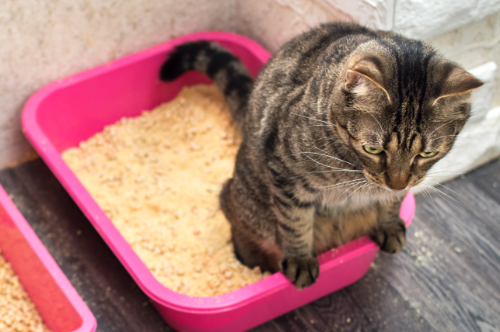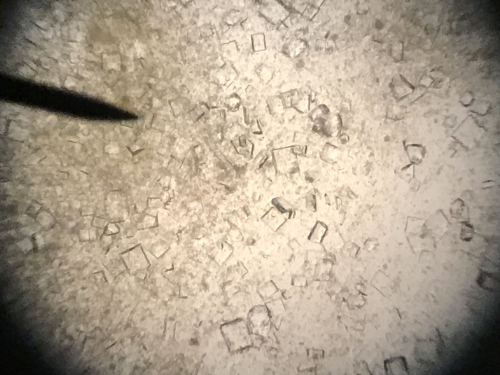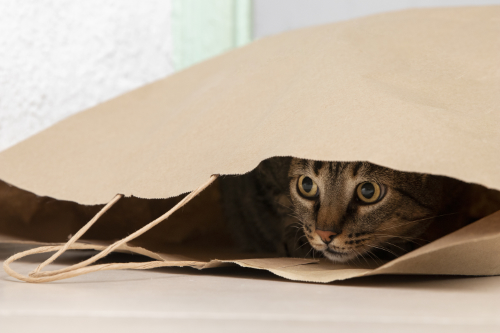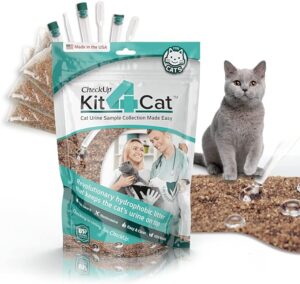Male cat with blood in his urine - How to resolve this
Can a tomcat have blood in his urine?
Unfortunately, your tomcat may indeed pee blood. And that is always something abnormal. However, it is common in tomcats. Your tomcat is probably urinating blood otherwise you probably weren’t looking for this topic. Probably you are shocked. And now you’re wondering what to do. We will first explain to you what could be wrong and then we will tell you what the possible solutions are if your tomcat has blood in his urine.
Why does your tomcat has blood in his urine?
If you find blood in your cat’s urine, there is something wrong somewhere in the urine production system. This starts with the kidneys, which filter the blood and produce urine. The urine is then transported via the ureters and these end in the bladder. Then there is a urethra from the bladder to the end of your male cat’s (small) penis. All these parts of the urinary tract consist of tissue that is itself nourished by blood vessels. When these tissues are damaged anywhere, blood appears in the urine.
Is blood in his urine dangerous?
The blood in the urine is not dangerous in itself. But the fact that his urinary tract is damaged can be dangerous. After all, if your kidneys no longer work properly, waste products will no longer be removed from your tomcat’s body and your cat will die. It is therefore important that the location of the blood loss and the damage caused by the blood loss are found.

Your tomcat has a little blood in his urine
When there is mild damage to the urinary tract, the amount of blood that ends up in the urine is very little. In principle, your male cat will then have slightly pink urine. Or sometimes even normal urine, with a few small blood clots in it. As mentioned, the damage at the moment is mild. But this can certainly turn into serious damage very quickly. At that moment your tomcat has a lot of blood in his urine.
Your tomcat has pure blood in his urine
If the damage to the urinary tract is more serious, quite a lot of blood can end up in the urine. As you know, blood can dissolve well in water and then small amounts suddenly seem huge. In most cases it seems worse than it is, but the damage to the urinary tract is quite serious.
Young tomcat pees blood
Younger male cats often urinate blood because they suffer from urinary crystals. We will tell you more about it below. It is rarely the case that a young cat urinates blood because, for example, he has bladder cancer.
Cat loses drops of blood while walking around
If your tomcat loses drops of blood while walking, he may have a cystitis. But we see this most often when a male cat has a blocked bladder. Since this is a life-threatening condition, we advise you to take him to your vet as soon as possible. Did you accidentally end up on this page and do you have a female cat? In that case there is probably just a cystitis. A cystitis can also occur in tomcats. But a bladder blockage must first be ruled out!
Causes why a tomcat has blood in his urine
The most common reason for your tomcat urinating blood is urinary crystals. In addition, a cystitis is also quite common in tomcats. Also stress is a common reason. Less common as a cause of urinating blood in a tomcat is bleeding from a polyp in the bladder. Or tumors in the kidneys, ureters, bladder or urethra, kidney failure or perhaps an accident has happened. And it is also possible that your cat has blood clotting problems, which means that small wounds do not close and continue to bleed.

Your tomcat has blood in his urine due to urinary crystals
Urinary crystals are formed in your cat’s urine when he filters certain minerals from his blood and they clump together into small crystals. We also call this urine crystals. Under the microscope, these crystals look like small grains of sugar. And you can imagine that if you keep rubbing the wall of your bladder with those grains, damage to the bladder wall can easily occur. And therefore a cystitis. This causes your tomcat to urinate blood.
However, what is also possible is that these small crystals stick together even further and small stones are formed. You can then see it with the naked eye. However, the tomcat’s penis is very small and has a very narrow urethra. These stones can quickly get stuck in it. The result is that your cat can not urinate properly or even at all. Stretching the bladder causes damage and causes blood to appear in the urine. Sometimes a tomcat can still pee a little urine at that moment, but it will look very bloody.
Your tomcat has blood in his urine due to a cystitis
The bladder wall can therefore be damaged by urinary crystals, as mentioned above. But this can also occur as a result of a bacterial infection. But stress can also cause the bladder wall to become inflamed very quickly. In all cases, the bladder wall becomes inflamed, which can also cause damage to the blood vessels in the bladder wall. The result is that blood appears in the urine and your male cat therefore urinates blood.
Your tomcat has blood in his urine due to stress
As we mentioned above, stress is also a major cause of urinating blood. Stress in cats can manifest itself in licking themselves on the belly, behavioral problems towards the owner or other pets, but it can also affect their bladder. In the latter case, the bladder has reduced resistance as a result of the stress. And, as a result of that, the smallest problem in the bladder can immediately lead to a cystitis and therefore urinating blood by your tomcat.

Tomcat urinating blood and drinks a lot
If your tomcat urinates blood and drinks a lot, unfortunately there is more going on. There is a possibility that your cat is urinating blood due to a kidney problem. It is also possible that your cat has a cystitis and that the infection has spread to the kidneys and is now causing damage to your cat’s kidneys. If you have noticed this in your cat, it is important that you take your cat to your vet for further examination. After all, without kidneys your cat can not stay alive.
Tomcat urinates blood and throws up
We sometimes see vomiting and urinating blood occur at the same time. In this case, it is possible that nausea may occur due to the inflammation in your cat’s body. But it is also possible that damage has occurred to the kidneys, which means that your cat can no longer get rid of its toxins. The result is nausea and vomiting in your cat. But stress can also cause nausea and a cystitis.
When should you take your cat to the vet if he has blood in his urine?
In fact, it is important in all cases that you take your cat to the vet when he urinates blood. After all, the cause can be quite serious and even threaten your cat’s life. So there’s every reason not to stare at it for too long. And of course your cat is also in pain in most cases. Of course, you want to prevent that as much as possible.
What treatment does your vet give?
Your vet will initially feel your male cat’s bladder to rule out a bladder blockage. If there is no bladder blockage, he will want to do a urine test. Of course, you already have the urine with you because you have isolated your cat for a while with a litter box containing Kit4Cat pellets. They do not absorb moisture, so your cat can pee on them. You can then aspirate it and take it to your vet. Saves another day of hospitalization for your cat, and thus money for you. Everything you need to collect the urine is in the package. This is the quickest way to find out the reason why your tomcat is urinating blood.
Your vet can use the urine test to see whether there urinary crystals or a bacterial cystitis. However, sometimes the amount of red blood cells in the blood makes these tests somewhat difficult and unreliable.
If there are urinary crystals, your vet will recommend a special cat food. The cystitis itself is treated with anti-inflammatory drugs. If there is a bacterial cystitis, your cat will be given a course of antibiotics. If all goes well, after a day or two you will hardly notice that your tomcat is urinating blood.
How do I know if my cat has a cystitis?
You can test for a cystitis yourself. But if there is already a lot of blood in the urine, this might be difficult. So it is better to have this carried out by your vet. But if you want, you can perform the urine test by collecting urine yourself using the above Kit4Cat pallets. You can do the urine test yourself using the test strips below.
Immerse the strip completely in the urine and remove it immediately. Shake off a little and leave for 30 seconds. You can then compare the test strip with the sample sheet. The blood in your cat’s urine makes comparing the colors a bit more difficult, so you have to take that into account.
With a cystitis, the pH is usually higher than 8, leucocytes are present (but this is often false positive in cats!), there are proteins in the urine and blood is also present. But you already knew that yourself. In healthy urine the pH should be below 7 and there should be no leucocytes, no proteins and no blood. Nitrite should not be in it either. If nitrite is present in the urine, this is a signal that there is probably a bacterial cystitis. Glucose and ketones may also not be present, but this is usually not the case with a cystitis. They indicate diabetes. Urobillinogen and billirubin might be raised when there is a liver problem. Specific gravity is unreliable, but should be around 1035 in normal cats. If it is a lot lower than you need to contact your veterinarian.
Collecting urine from a cat with blood in his urine
We have already discussed this briefly above. Cats often urinate in the litter box and the granules absorb the urine. This is therefore useless for further research into the cause of why your tomcat is urinating blood. That is why special granules must be placed in the litter box that do not absorb urine. Kit4cat is suitable for that. The bag contains the granules, a pipette to suck up the urine and a tube to store the urine.
You clean the litter box thoroughly so that there is no dust from the cat litter in it. Then rinse the container very well with water so that any soap residue is also gone. After all, the residue can change the results of the test strips. Then dry the container thoroughly and put the Kit4Cat granules in the container. Also make sure that no other pets can urinate on the litter box!
What can you do yourself if your tomcat has a cystitis?
As long as there is no bacterial cystitis, you can try to resolve your cat’s cystitis by giving your cat a urinary crystal less diet. This is the most common cause of cystitis and therefore blood urination with your tomcat. However, he will need this food for the rest of his life. But, do not give this food to cats under one year of age, or to cats with chronic renal failure.
If you have a painkiller at home for cats, you can also give it. This is, for example, novacam, metacam or rimadyl. You can also sometimes give your cat aspirin as a painkiller, but this is too much of a blood thinner and is therefore not wise to give in this case. Other painkillers for humans are fatal for cats and therefore not suitable for use at all. If you still want to do something, you can use CBD oil, but it does not work as well as the painkillers that are specially made for cats. CBD oil has an anti-inflammatory effect, which is why it is suitable to give if your tomcat when he is urinating blood. This is also a good stress reliever.
Your cat urinates blood after bladder surgery
If your cat still urinates a little blood the day after the operation, this is generally not surprising. After all, damage was caused to the bladder or urinary tract during the operation, so it is logical that some blood will be urinated. However, this must be reduced by a significant amount every day. If this is not the case, it is necessary to contact your own veterinarian to discuss what the cause could be and whether it is logical for your cat to urinate blood or not.
Good luck!
We hope hope your cat is soon recovering from urinating blood and that he can have a long and happy life! Good luck for the both of you.





